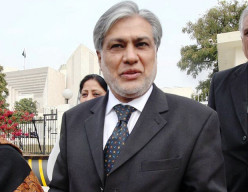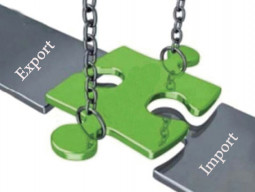
KARACHI:
“Blessed are the young for they shall inherit the national debt,” former US President Herbert Hoover is said to have remarked with regard to the dangers of accumulating long-term national debt. After all, actual borrowers are rarely around when the payback time comes.
With Pakistan’s total public debt reaching Rs15.49 trillion, or 63.3% of the country’s gross domestic product (GDP), many analysts are questioning the rationale of raising $2 billion from international debt markets through five- and 10-year dollar-denominated Eurobonds at rates that are 5.5% higher than the US Treasury rates.
Can we really afford to borrow at 7.25%-8.25%, although Pakistan issued its 2007 Eurobonds at a premium of only 325 basis points above the US Treasury rates?
Speaking to The Express Tribune on Saturday, Arif Habib Corporation CEO Arif Habib said the decision to issue dollar-denominated Eurobonds will improve liquidity in the local market and lead to an overall reduction in interest rates in the economy.

“I think it’s a sensible move. It’ll benefit us immensely if it succeeds in easing pressure from the local debt market and banks,” Habib noted.
Pointing out the recent change in government’s domestic borrowing pattern from short-term treasury bills to long-term Pakistan Investment Bonds (PIBs), he said interest rates are eventually going to come down while pushing the banks towards increased asset financing in the private sector.
“This will lower interest rates and reduce the government’s own liability. It pays Rs1.1 trillion in interest annually. Paying a little more in percentage terms on Rs200 billion will be compensated by the decreased interest rates applicable to the rest of the debt,” Habib said, adding he had been urging the government to borrow a ‘few billion dollars’ from the international market to avoid ‘blackmail’ at the hands of local players.
According to Muhammad Shamoon Tariq, who heads the Pakistan operations of Sweden-based mutual fund Tundra Fonder, the premium of 550 basis points that recently released Eurobonds offer over the US treasury rate is ‘justified’.
Given Pakistan’s junk rating, less than two months of import cover, foreign reserves being 45% lower than the 2007 level, and credit default swaps being 2.5 times higher than the 2007 level, Tariq said the risk taken by international investors justifies the higher yield.
“Structural change in the political situation, IMF’s reaction to the reform agenda, and positive developments on the macro-economic front make Pakistan an attractive market for bonds,” Tariq added.
Admittedly, analysts showing optimism in the wake of the successful issue of $2 billion Eurobonds far outnumber the doomsayers. But the market’s largely positive response is less than unanimous for sure.
“The view that the Eurobond sale was met with (global) market confidence is a farce. Pakistan’s yields are higher than those of Greece, an economy in depression,” said Asif Punjwani, a Texas-based derivatives trader, while speaking to The Express Tribune.
Notably, the last time Pakistan floated the foreign bond was in May 2007, which was right before the country had to be bailed out by IMF, he added.
“Pakistan ended up borrowing from the international capital markets precisely because it squandered its reserves by running huge trade imbalances. These trade imbalances are still intact. In fact, shoring up reserves from Eurobonds and propping up the rupee via foreign exchange intervention will further worsen trade imbalances,” Punjwani said.
Trade deficit, which is the difference between the value of exports and imports, reached $13.9 billion in July-March of 2013-14. Theoretically speaking, there are only three ways to get hold of dollars: trade surplus, remittances and foreign borrowing.
“Unless playing musical chair with foreign debt is the economic policy, there’s only remittance to rely on,” he said.
In a world of slowing demand and oversupply, he said, it will be hard to reduce trade deficit – let alone run a surplus. “Since the lack of demand has a deflationary effect, real yields on dollar-denominated debt will be higher than nominal,” he noted.
Published in The Express Tribune, April 14th, 2014.
Like Business on Facebook, follow @TribuneBiz on Twitter to stay informed and join in the conversation.
COMMENTS (17)
Comments are moderated and generally will be posted if they are on-topic and not abusive.
For more information, please see our Comments FAQ













































Pakistan’s yields are higher than those of Greece, an economy in depression . Says it all - one of those Elephant in the Room things that Pakistan has grown accustomed to ignoring.
Nothing to worry about. The Bonds have been purchased by saudia. Most likely this will also become a grant. This is truly brotherly love!!
@abdullah: clearing the mess? How? By borrowing at hefty price?
and we know this debt will be use for purchasing laptops and and building metro bus...such a vision of government
Musharraf had enacted a law that all national borrowings/debts will first need to be debated in the Parliament before they could be incurred, Why is the law being bypassed Why no suo moto on this critical issue ?
Greece raise funds for 5 years at 4.5%. This is same Greece who was bail out by European Union. The Pakistan rating is higher than the Greece and we raised at the hefty price.
Public decide why it was raised at this price and who will get the benefit?
@AliG: As a country we have to accept the fact that we cannot cannot reduce the Government spending, cannot improve direct tax collection, liberalize SBP, Raise taxes, remove exempt.
Then why do you keep promising IMF that you will do all of the above?
In addition, why do you provide targets to IMF? For instance, Pakistan provided targets to IMF to collect taxes from defaulters by setting up a mechanism to identify them and go after them, yet all that has been done so far is a half-hearted attempt to send notices to non-existent people.
Loans-Loans-Loans and Loans This has brought the country at the verge of bankruptcy the loans stand now 130 billion dollars plus and with no output. Where is this money spent?
No Dams.... No roads No public infrastructure and most interesting part
This money not in Pakistani banks
We as a nation are never happy of anything .though i am not a supporter of PML-N but i am happy the way they are clearing the mess of other parties and taking the nation ahead..
@AliG: "we cannot reduce the Government spending, cannot improve direct tax collection, liberalize SBP, Raise taxes, remove exemptions". I thought that was the mandate PMLN before the election. All the previous government did the same thing....borrow!!
@base2: Easy on this amateur economic non-sense you are writing! The IMF plan you are mentioning is a stupid plan. For a country like Pakistan you cannot enforce the policies of the European style Austerity program. As a country we have to accept the fact that we cannot cannot reduce the Government spending, cannot improve direct tax collection, liberalize SBP, Raise taxes, remove exemptions. The only way we can save this economy is by increasing the Investment and Growth, which IMF clearly asks us to keep in lower range in order to reduce the inflationary pressure. So without proper knowledge about these issues, don't pass your judgements on the financial manouvering our finance ministry is doing to save the economy from a complete collapse.
Oh and another thing I'd like to point out. This article talks about long term debt and quotes an American president. When we talk about long term US govt. debt we are talking about 25 years, 30 years, 50 years even. Here the bonds will have to be paid back in 10 years. Not exactly something that spans multiple generations, is it? Anyway I doubt any foreigners would have lent us money for multiple decades.
@Saleem: The IMF presented a better plan. The govt. even agreed to it. But it hasn't been implemented. There has been no privatization, rupee depreciation has been reversed, SBP autonomy is no where to be seen, and nothing has been done to raise tax income.
The country ran a $13.93 deficit in the first 9 months despite extensive rupee depreciation. Now that the rupee has appreciated the trade deficit will only rise. We will have $2 billion worth of outflow in 45 days. That should tell you how worthless this whole exercise was if the aim was to raise foreign exchange.
If the aim was to raise debt to finance the fiscal deficit then we will pay through the nose for it. The rupee will depreciate by at least 5% per year so that needs to be taken into account in addition to the interest rate on the bonds.
@Saleem:
"Unless those who are critical of this move has a better suggestion/plan it be best they sit tight with their lips seal."
Economically successful countries borrow money to invest in national projects to create economic growth and job creation. Borrowing to generate economic growth can be a good long term plan.
However, in the case of Pakistan, all the borrowed and aid money in the past several decades have been used to build more nuclear bombs, missiles, fighter jets, submarines and other huge military spending besides servicing interest on past debts. This kind of spending will not help grow the economy, but will only sink the country and the future generations in growing debt and economic instability. The only solution to this is for Pakistan to reevaluate its policy of "we will eat grass to get atom bomb" and the unwinnable geopolitical games.
This is little reason to consider this bond issue as a great achievement.
People will lend to you as long as the return for them is high enough!
This is another borrowing - not something that we have earned nor foreign investment!. We have to repay it.
Issuance of such bonds sets benchmarks for your debt. Once this is done, all assets get priced accordingly. This issue sets a very high benchmark for our country risk. You should always set the benchmark when you have least urgent need for funds.
Why do we need to borrow money at such high rates if the narrative that the economy is doing very well? The fact is that we will continue to increase our borrowings in rupees. There is no likelihood of any reduction in borrowings.
The yield on these bonds is more than being paid by Greece - a country that is bankrupt and has defaulted on loans.
It is very easy, rather insane, to criticize someone else's decision when you have nothing yourself to offer. It may not be the best decision to raise money through these kinds of offerings but some how Pakistan needs to move economic wreck of Musharaf and PPP's last government. Unless those who are critical of this move has a better suggestion/plan it be best they sit tight with their lips seal.